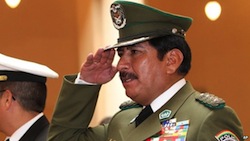Amid further allegation of high level narco penetration of Bolivia’s police force, authorities stated that a former general worked with Mexico’s Sinaloa Cartel, allowing the Mexican group to expand operations in this strategic Andean nation.
After years of suspicion, former police chief Oscar Nina was arrested for allegedly benefitting from ties to drug traffickers. Interior Minister Hugo Moldiz told reporters “it is certain there was a relationship” between Nina, once head of the country’s anti-narcotics squad (FELCN), and the son of former Sinaloa Cartel leader Joaquin “El Chapo” Guzman, Jornada reported.
Moldiz confirmed that Jesus Guzman, Chapo’s son, travelled to the eastern city Santa Cruz in 2011, attended a flight school, and met with members of the FELCN, which vindicates an explosive 2011 report from TV network Univision detailing the Sinaloa Cartel’s links to Bolivian police. Univision cited intelligence reports showing the Sinaloa cartel gained a foothold in the drug trade in Santa Cruz with complicity from officials in the FELCN, including Nina. At the time, the government denounced the investigation as a smear campaign.
Investigators now say Nina accumulated a $3 million fortune, according to La Razon. The prosecutor in the case has ordered the seizure of all the general’s assets.
InSight Crime Analysis
Nina’s alleged ties to Mexican organized crime highlight Bolivia’s growing importance as a transit nation in the drug trade. As InSight Crime has reported, producing cocaine in Bolivia is cheaper than producing it in Colombia, and the country provides a bridge from coca producing regions in Peru to consumer markets in Brazil, Argentina, and eventually Europe. The presence of Colombian drug traffickers in Bolivia has been well documented, as conditions in the country facilitate transnational crime.
SEE ALSO: Evo’s Challenge: Bolivia the Drug Hub
In recent years, the Sinaloa Cartel has tried to deepen its control over the South American supply chain. Given the Sinaloa Cartel’s appetite for expansion, the group’s reported presence in Santa Cruz may indicate that Mexican organized crime is trying to cash in on the cheaper costs of moving cocaine through Bolivia. Indeed, a pilot linked to the Sinaloa Cartel was killed by police in Peru in 2013 while trying to move 270 kilograms of cocaine to Bolivia.

